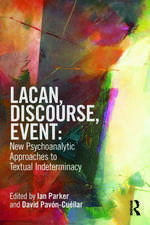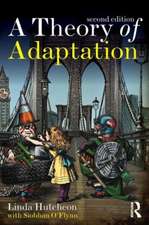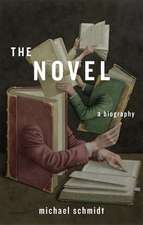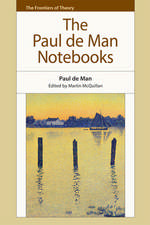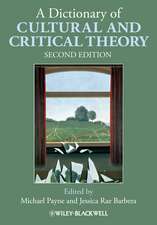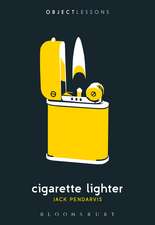The Afterlives of Roland Barthes
Autor Professor Neil Badmingtonen Limba Engleză Paperback – 18 apr 2018
| Toate formatele și edițiile | Preț | Express |
|---|---|---|
| Paperback (1) | 235.36 lei 43-57 zile | |
| Bloomsbury Publishing – 18 apr 2018 | 235.36 lei 43-57 zile | |
| Hardback (1) | 713.29 lei 43-57 zile | |
| Bloomsbury Publishing – 19 oct 2016 | 713.29 lei 43-57 zile |
Preț: 235.36 lei
Preț vechi: 304.51 lei
-23% Nou
Puncte Express: 353
Preț estimativ în valută:
45.06€ • 46.34$ • 37.38£
45.06€ • 46.34$ • 37.38£
Carte tipărită la comandă
Livrare economică 17 februarie-03 martie
Preluare comenzi: 021 569.72.76
Specificații
ISBN-13: 9781350066991
ISBN-10: 1350066990
Pagini: 176
Dimensiuni: 156 x 234 mm
Greutate: 0.25 kg
Ediția:NIPPOD
Editura: Bloomsbury Publishing
Colecția Bloomsbury Academic
Locul publicării:London, United Kingdom
ISBN-10: 1350066990
Pagini: 176
Dimensiuni: 156 x 234 mm
Greutate: 0.25 kg
Ediția:NIPPOD
Editura: Bloomsbury Publishing
Colecția Bloomsbury Academic
Locul publicării:London, United Kingdom
Caracteristici
Revisits the work of cultural theorist Roland Barthes in light of his posthumously published writings
Notă biografică
Neil Badmington is Professor of English at Cardiff University, UK. His previous books include Hitchcock's Magic (2011) and Alien Chic: Posthumanism and the Other Within (2004) and he is the co-editor (with David Tucker) of The Year's Work in Critical and Cultural Theory.
Cuprins
1 Introduction: The Afterlives of Roland Barthes 2 For Henriette's Tomb: Mourning with Mallarmé3 Punctum Saliens: Mourning, Film, Photography4 The 'Inkredible' Roland Barthes 5 Bored with Barthes: Ennui in China6 Hitchcock Hapax: Realism RevisitedPostscript: Afterlives' AfterlivesBibliographyIndex
Recenzii
An exploration of Roland Barthes's posthumously published writings, Neil Badmington's book offers an important contribution to Barthes Studies. Badmington's text, both pedagogically accessible and convincingly argued, places import on Barthes's posthumous literature, which includes Mourning Diary, Travels in China, and the unfinished Vita Nova, to reappraise the major texts published during the semiotician's lifetime . The critical rigour, clarity, and accessibility of Badmington's text would be appreciate by Barthesian scholars and university students working from the perspective of both French and Anglophone Studies. The wealth of accompanying end-of-chapter notes offers rich biographical details and bibliographic references, which further underscore this work's dialogic contribution to Barthes Studies. Far from haunting, as Badmington reminds us, Barthes's afterlives are very much kept alive in the interstitial pleasures and boredoms of his prose.
This book is an important contribution to scholarship on Barthes in English, and in addition to its detailed and original analyses there are many interesting asides in the footnotes . It is also a model of stylish and engaging academic prose.
Barthes-like Heidegger and Foucault-has had a prolific posthumous publishing career. Badmington (Cardiff Univ., UK) undertakes to situate this diverse posthumous work. With remarkable concision, he not only explicates this work but also contextualizes it within Barthes's better-known published work. For instance, Badmington's exploration of the Mourning Diary in essence shows one the genesis of Camera Lucida. It is precisely this careful critical balancing-of the exegesis of the new and the anchoring in the well known-that makes this study so valuable. Accomplished with Badmington's scholarly care, this critical balance serves ultimately not to provide "origin stories" to texts that are now part of the theoretical-critical canon, but rather to open up the originary force of Barthes's thinking, to remove it from the danger of overfamiliarity. Badmington concludes his study with an intriguing consideration of Barthes and Hitchcock-a figure noted for his conspicuous absence in Barthes's work. A final, Barthesian note: Bloomsbury is to be commended for making a book that feels nice in one's hands. Summing Up: Recommended.
Badmington is at his best when his inquiry is personal and playful ... A chapter on "the neglected history of boredom" in Barthes is the book's most engaging and original contribution.
Badmington's mode of address, across these diverse topics, is engaging and nuanced, and supported by a wealth of textual, theoretical, and biographical detail.
Badmington succeeds in delivering eloquent and scholarly yet highly readable prose on one of the most challenging contemporary critics [.] Badmington's study is required reading for Barthes scholars, while non-specialists will also find it an enjoyable read since it is both a personal record and a scholarly work on the history of understanding Barthes - the notes sections alone are a feast of reading!
This book is an important contribution to scholarship on Barthes in English, and in addition to its detailed and original analyses there are many interesting asides in the footnotes . It is also a model of stylish and engaging academic prose.
Barthes-like Heidegger and Foucault-has had a prolific posthumous publishing career. Badmington (Cardiff Univ., UK) undertakes to situate this diverse posthumous work. With remarkable concision, he not only explicates this work but also contextualizes it within Barthes's better-known published work. For instance, Badmington's exploration of the Mourning Diary in essence shows one the genesis of Camera Lucida. It is precisely this careful critical balancing-of the exegesis of the new and the anchoring in the well known-that makes this study so valuable. Accomplished with Badmington's scholarly care, this critical balance serves ultimately not to provide "origin stories" to texts that are now part of the theoretical-critical canon, but rather to open up the originary force of Barthes's thinking, to remove it from the danger of overfamiliarity. Badmington concludes his study with an intriguing consideration of Barthes and Hitchcock-a figure noted for his conspicuous absence in Barthes's work. A final, Barthesian note: Bloomsbury is to be commended for making a book that feels nice in one's hands. Summing Up: Recommended.
Badmington is at his best when his inquiry is personal and playful ... A chapter on "the neglected history of boredom" in Barthes is the book's most engaging and original contribution.
Badmington's mode of address, across these diverse topics, is engaging and nuanced, and supported by a wealth of textual, theoretical, and biographical detail.
Badmington succeeds in delivering eloquent and scholarly yet highly readable prose on one of the most challenging contemporary critics [.] Badmington's study is required reading for Barthes scholars, while non-specialists will also find it an enjoyable read since it is both a personal record and a scholarly work on the history of understanding Barthes - the notes sections alone are a feast of reading!


